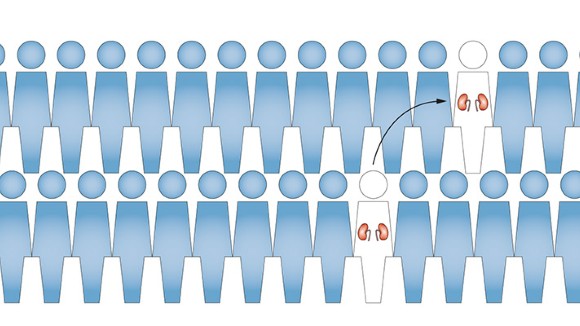Transplantation: Pro-tolerogenic properties of erythropoietin
Ellen F. Carney
Erythropoietin (EPO) has immunomodulatory effects that promote tolerance to kidney allografts, say researchers. EPO is predominantly produced by renal pericapillary fibroblasts and is required for the differentiation of red blood cells in the bone marrow, but also has non-erythropoietic effects.
Transplantation: A new tolerance strategy for diabetic recipients
Ellen F. Carney
A novel approach involving transplantation of composite islet–kidney (IK) grafts in combination with tolerance induction could potentially become an attractive treatment option for diabetic patients with end-stage renal disease (ESRD) say researchers. Kazuhiko Yamada and colleagues report that this strategy enabled graft acceptance and reduced the need for insulin therapy in a Rhesus macaque model.
Transplantation: Efficacy of rapid steroid withdrawal after induction therapy
Andrea Aguilar
New data from the Harmony trial show that in renal transplant recipients with a low immunological risk profile, rapid corticosteroid withdrawal after rabbit anti-thymocyte globulin (ATG) or basiliximab induction therapy can be achieved without compromising the efficacy of standard low-dose tacrolimus and mycophenolate mofetil (MMF)-based immunotherapy.
Transplantation: Continuous normothermic ex vivo perfusion improves kidney graft function
Ellen F. Carney
Pressure-controlled continuous normothermic ex vivo kidney perfusion (NEVKP) improves renal graft function in pigs, say researchers. Markus Selzner and colleagues suggest that use of this preservation technique might reduce rates of delayed graft function and improve outcomes in kidney transplantation.
Transplantation: Long-term risk of ESRD in living donors
Andrea Aguilar
The life-time risk of end-stage renal disease (ESRD) in living kidney donors is often extrapolated from studies that follow donors for <10 years, although the aetiology of early and late post-donation ESRD might differ. New research from Dorry Segev and colleagues shows that the risk of ESRD is higher late after donation (10–25 years) than the risk <10 years after donation, and that different aetiologies lead to early and late post-donation ESRD.
Transplantation: Reverse chimerism enables graft acceptance
Ellen F. Carney
Induction of reverse chimerism in renal allografts by mobilizing host stem cells from the bone marrow enables long-term graft acceptance in animal models, say Zhaoli Sun and colleagues.

Transplantation: New tool for prediction of ESRD risk in living kidney donor candidates
Ellen F. Carney
Current evaluation of candidates for living kidney donation involves screening for individual risk factors for end-stage renal disease (ESRD). Now, researchers have developed an online tool to aid donor selection that predicts the long-term risk of ESRD in donor candidates in the absence of kidney donation.
Transplantation: Wide variation in rates of dialysis facility referrals to transplant centres
Jessica K. Edwards
The rates of referral from dialysis facilities to transplant centres are lower than expected and exhibit wide variation across the US state of Georgia, according to new research by Rachel Patzer and colleagues. These researchers previously reported that patients in Georgia have the lowest level of access to kidney transplantation in the USA, but the limiting step to transplant access was unknown.
Transplantation: Optimizing ECD graft outcomes
Ellen F. Carney
A strategy of allocating extended criteria donor (ECD) kidneys only to recipients without anti-HLA donor-specific antibodies (DSAs) and reducing cold ischaemia time to <12 h could significantly improve the long-term outcomes of ECD transplantation, according to new findings from Alexandre Loupy and colleagues. They state that these data support a need for ECD-specific transplant allocation policies to enable optimal use of this valuable resource.

Transplantation: Mild hypothermia improves transplantation outcomes
Susan J. Allison
The induction of therapeutic hypothermia in deceased organ donors significantly reduces delayed graft function in kidney transplant recipients, according to new findings. “Our research shows that slight cooling of deceased kidney donors can substantially increase transplantation success and the pool of potential donors,” explains Claus Niemann.
Transplantation: The molecular landscape of ABMR
Susan J. Allison
Antibody-mediated rejection (ABMR) is characterized by molecular changes that indicate a role for injury–repair mechanisms in the microcirculation that are likely mediated by natural killer (NK) cell signalling through CD16a Fc receptors, according to new findings. “Our study mapped the molecular landscape associated with ABMR of kidney transplants,” explains researcher Philip Halloran.
 Transplantation: Promising outcomes of HIV-positive-to-HIV-positive kidney transplantation
Transplantation: Promising outcomes of HIV-positive-to-HIV-positive kidney transplantation
Ellen F. Carney
Transplantation of kidneys from HIV-positive donors is “an additional treatment option” for HIV-positive patients who require renal replacement therapy, suggest Elmi Muller and colleagues. In their new paper, these researchers report the medium-term outcomes of HIV-positive-to-HIV-positive kidney transplantation in Groote Schuur Hospital, South Africa.


